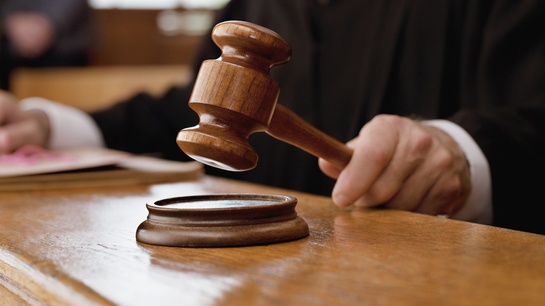A federal judge has decided the city of Baltimore must pay back the $31,500 it took from a Black woman who settled a lawsuit in 2012 because she publicly discussed allegations that police assaulted her.
According to The Baltimore Sun, the judge found the city acted illegally when it withheld half of Ashley Overbey Underwood’s settlement for violating a "non-disparagement clause," also known as a gag order.
On April 30, 2012, Underwood sued the city after alleging that three officers beat her in her home while responding to a call regarding a burglary. She said they tackled, choked, tasered, and handcuffed her. Following the assault, she was jailed for 24 hours and charged with six counts of assault and one count of resisting arrest.
The charges were later dropped and she settled with the city for $63,000.
Web critics questioned Underwood’s motives, accusing her of initiating her own arrest for financial gain. After she publicly defended herself by telling her side of the events, city lawyers put a halt on the settlement payments due to a gag order, The Sun reports.
"Despite her voluntary agreement to the contrary, Ms. Overbey violated the express terms of her settlement agreement by making a number of disputed comments about the case," Deputy Solicitor David Ralph said in a statement. "As a result of her violation of the agreement, the City Law Department paid her the amount agreed upon by the parties in the event of a breach of the agreement."
The city pursued legal action against Underwood to garner her money despite a city ban on gag orders, according to court filings obtained by The Sun.
On Monday, the city was ordered to reimburse the money plus interest at 6% annually.
“By its conduct in unconstitutionally enforcing the now discredited clause, the city withheld half of the settlement proceeds,” U.S. District Judge Deborah K. Chasanow wrote.
Last year, the Baltimore City Council unanimously passed legislation that bans the use of gag orders in city settlements for police brutality and discrimination cases, according to WYPR, Baltimore's public radio station. The motion succeeded the Fourth U.S. Circuit Court of Appeals decision that gag orders issued by the city was unconstitutional, per The Washington Post.
“The seeming inference is that their illegal act should not be undone simply because no one thought, or even suspected, it was illegal at the time,” Chasanow wrote. “Just as ‘strong public interests’ render the clause unenforceable, those interests counsel against allowing the city to keep the fruits of such improper enforcement."
In a statement released to media outlets, Underwood expressed gratitude for her supporters.
“It’s been hurtful to see and hear so many horrible things that happened,” Underwood said. “But at the end of the day, it’s been amazing that we as a people stood together and was able to stand up to the bullies. If you have anything unjustly done to you, don’t give up, no matter how big that bully is."
"I stood up for my rights," Ashley Overbey Underwood said. "A home run for the 1st Amendment," @ACLU_MD said. "Thrilled to see judges affirm the unconstitutionality of the gag orders,” Fern Shen said https://t.co/WLNw94Z5DO
#WeWonInThe4thCircuitToday! pic.twitter.com/xEhrmDSTvs— Baltimore Brew (@BaltimoreBrew) July 11, 2019
City Council President Brandon Scott said the judge’s ruling was the correct move and sets a standard for public officials.
“As a city, we must own our mistakes and be accountable to Baltimore residents,” he said.
The city will forgo an appeal and will work to get the owed payment to Underwood as 'expeditiously as possible,' Baltimore City Solicitor Dana Moore said.
On Tuesday, The ACLU Legal Director Deborah Jeon said in a statement that Underwood’s case is a reminder that free speech is meaningless in this country until all people have protected rights.
“For free speech to truly have meaning it must protect the rights of all people, and for too long Black people have had their free speech rights denied when they challenge abuse at the hands of police. This victory helps create a precedent that advances the First Amendment, so that hopefully one day it will truly protect everyone in the United States,” Jeon said.
